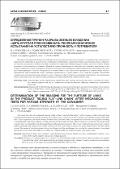| dc.contributor.author | Ковалева, И. А. | |
| dc.contributor.author | Ходосовская, Н. А. | |
| dc.contributor.author | Гузова, И. А. | |
| dc.coverage.spatial | Минск | ru_RU |
| dc.date.accessioned | 2024-04-16T08:33:52Z | |
| dc.date.available | 2024-04-16T08:33:52Z | |
| dc.date.issued | 2022 | |
| dc.identifier.citation | Ковалева, И. А. Определение причин разрыва звеньев в изделии «цепь круглая плоскозвенная» после механических испытаний на усталостную прочность у потребителя / И. А. Ковалева, Н. А. Ходосовская, И. А. Гузова // Литье и металлургия. – 2022. – № 4. – С. 47–50. | ru_RU |
| dc.identifier.uri | https://elib.gstu.by/handle/220612/33379 | |
| dc.description.abstract | В статье описаны проведенные исследования изделия «цепь круглая плоскозвенная» с разрывом трех звеньев после термической обработки и механических испытаний у потребителя. Целью проведения исследований явилось определение причины разрушения звеньев цепи. При визуальном осмотре цепи выявлены разрывы трех звеньев из девяти. Разрыв произошел в зоне заводского клеймения. Проведено металлографическое исследование двух образцов, вырезанных из звена цепи с разрывом и звена без разрыва. В ходе исследования был обнаружен поверхностный слой, отличимый от основной микроструктуры. Наличие обнаруженного поверхностного слоя обусловлено проведением поверхностной закалки. Упрочненная зона поверхности звена с разрывом практически в 2 раза меньше, чем в звене без разрыва. Количество остаточного аустенита больше и крупнее в звене с разрывом. В результате исследований установлено, что разрушение звеньев цепи произошло по причине нарушения режима термообработки поверхностного слоя. | ru_RU |
| dc.description.abstract | The article describes the conducted research of the product “round flat-link chain”, with the rupture of three links after heat treatment and mechanical tests at the consumer. The purpose of the research was to determine the cause of the destruction of the chain links. Visual inspection of the chain revealed breaks in three of the nine links. The rupture occurred in the area of factory branding. A metallographic study of two samples cut from a chain link with a break and a link without a break was carried out. During the study, a surface layer was found that was distinguishable from the main microstructure. The presence of the detected surface layer is due to surface hardening. The hardened area of the surface of the link with a break is almost two times smaller than in the link without a break. The amount of residual austenite is larger and larger in the link with the gap. As a result of the conducted studies, it was found that the destruction of the chain links occurred due to a violation of the heat treatment regime of the surface layer. | |
| dc.language.iso | ru | ru_RU |
| dc.publisher | БНТУ | ru_RU |
| dc.subject | Эксплуатация цепей | ru_RU |
| dc.subject | Термическая обработка | ru_RU |
| dc.subject | Цепь круглая плоскозвенная | ru_RU |
| dc.subject | Излом | ru_RU |
| dc.subject | Волокнистое строение | ru_RU |
| dc.subject | Металлографический анализ | ru_RU |
| dc.subject | Мартенсит | ru_RU |
| dc.subject | Остаточный аустенит | ru_RU |
| dc.subject | Operation of chains | ru_RU |
| dc.subject | Heat treatment | ru_RU |
| dc.subject | Поперечное сечение | ru_RU |
| dc.subject | Fracture | ru_RU |
| dc.subject | Fibrous structure | ru_RU |
| dc.subject | Metallographic analysis | ru_RU |
| dc.subject | Crosssection of the studied samples | ru_RU |
| dc.subject | Martensite | ru_RU |
| dc.subject | Residual austenite | ru_RU |
| dc.title | Определение причин разрыва звеньев в изделии «цепь круглая плоскозвенная» после механических испытаний на усталостную прочность у потребителя | ru_RU |
| dc.title.alternative | Determination of the reasons for the rupture of links in the product “round flat-link chain” after mechanical tests for fatigue strength at the consumer | ru_RU |
| dc.type | Article | ru_RU |
| dc.identifier.udc | 669.21 | |
| local.identifier.doi | 10.21122/1683-6065-2022-4-47-50 | |
